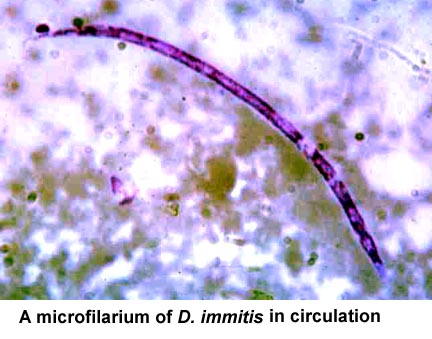CASE DISCUSSION
 We usually think of heartworm as a problem of dogs, but other species are also affected by this mosquito-borne parasite. Some marine mammals are also infected with it. Ferret heartworm is under-recognized, especially in areas where heartworm in dogs isn't a routine occurrence.
We usually think of heartworm as a problem of dogs, but other species are also affected by this mosquito-borne parasite. Some marine mammals are also infected with it. Ferret heartworm is under-recognized, especially in areas where heartworm in dogs isn't a routine occurrence.
As the map at left shows, heartworm is most prevalent in areas where mosquitoes are common: the Gulf Coast and the Mississippi Valley are especially risky places, while the dry desert states of the west are significantly less likely to have high rates of heartworm disease. Dweezil's owner was from Orlando, smack in the middle of some of the most heavily mosquito-infested area in the country. Dweezil met on of these insects and was infected.
 The lung is actually a colossal capillary plexus, fed directly from the heart: if the worms were only "heart" worms there might be less trouble, but it's the intereference with lung circulation that's significant. The worms preferentially occupy the pulmonary vessels leading from the heart; their presence will block blood flow to the lungs significantly. Hence the presenting symptoms of lassitude and easy fatigue: reduced perfusion of lung capillary beds means less oxygen transfer to blood and less available for distribution to the general body. Ferrets are very small animals. A load of only a few mature worms, that wouldn't bother a normal sized dog, is enough to give them problems. Dweezil's vet didn't get a positive on an occult heartworm test because there weren't enough worms in him to release the antigens to detectable levels. So he was treated for what looked like idiopathic congestive heart failure (a diuretic—furosemide—to expel excess fluid, and digitalis to control possible arhythmia). It's not surprising this was useless, because the worms were still there.
The lung is actually a colossal capillary plexus, fed directly from the heart: if the worms were only "heart" worms there might be less trouble, but it's the intereference with lung circulation that's significant. The worms preferentially occupy the pulmonary vessels leading from the heart; their presence will block blood flow to the lungs significantly. Hence the presenting symptoms of lassitude and easy fatigue: reduced perfusion of lung capillary beds means less oxygen transfer to blood and less available for distribution to the general body. Ferrets are very small animals. A load of only a few mature worms, that wouldn't bother a normal sized dog, is enough to give them problems. Dweezil's vet didn't get a positive on an occult heartworm test because there weren't enough worms in him to release the antigens to detectable levels. So he was treated for what looked like idiopathic congestive heart failure (a diuretic—furosemide—to expel excess fluid, and digitalis to control possible arhythmia). It's not surprising this was useless, because the worms were still there.
Ferrets, like dogs, can be given preventive drugs to avoid heartworm disease. Ivermectin and similar anti-filarial drugs work in ferrets, though for some of them there's controversy about their safety. The widespread use of prophylactic medication has significantly reduced canine heartworm disease in the past 30 years, and the problem in ferrets is being more ferquently recognized.
 We usually think of heartworm as a problem of dogs, but other species are also affected by this mosquito-borne parasite. Some marine mammals are also infected with it. Ferret heartworm is under-recognized, especially in areas where heartworm in dogs isn't a routine occurrence.
We usually think of heartworm as a problem of dogs, but other species are also affected by this mosquito-borne parasite. Some marine mammals are also infected with it. Ferret heartworm is under-recognized, especially in areas where heartworm in dogs isn't a routine occurrence. The lung is actually a colossal capillary plexus, fed directly from the heart: if the worms were only "heart" worms there might be less trouble, but it's the intereference with lung circulation that's significant. The worms preferentially occupy the pulmonary vessels leading from the heart; their presence will block blood flow to the lungs significantly. Hence the presenting symptoms of lassitude and easy fatigue: reduced perfusion of lung capillary beds means less oxygen transfer to blood and less available for distribution to the general body. Ferrets are very small animals. A load of only a few mature worms, that wouldn't bother a normal sized dog, is enough to give them problems. Dweezil's vet didn't get a positive on an occult heartworm test because there weren't enough worms in him to release the antigens to detectable levels. So he was treated for what looked like idiopathic congestive heart failure (a diuretic—furosemide—to expel excess fluid, and digitalis to control possible arhythmia). It's not surprising this was useless, because the worms were still there.
The lung is actually a colossal capillary plexus, fed directly from the heart: if the worms were only "heart" worms there might be less trouble, but it's the intereference with lung circulation that's significant. The worms preferentially occupy the pulmonary vessels leading from the heart; their presence will block blood flow to the lungs significantly. Hence the presenting symptoms of lassitude and easy fatigue: reduced perfusion of lung capillary beds means less oxygen transfer to blood and less available for distribution to the general body. Ferrets are very small animals. A load of only a few mature worms, that wouldn't bother a normal sized dog, is enough to give them problems. Dweezil's vet didn't get a positive on an occult heartworm test because there weren't enough worms in him to release the antigens to detectable levels. So he was treated for what looked like idiopathic congestive heart failure (a diuretic—furosemide—to expel excess fluid, and digitalis to control possible arhythmia). It's not surprising this was useless, because the worms were still there.